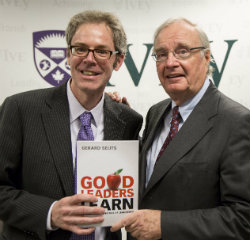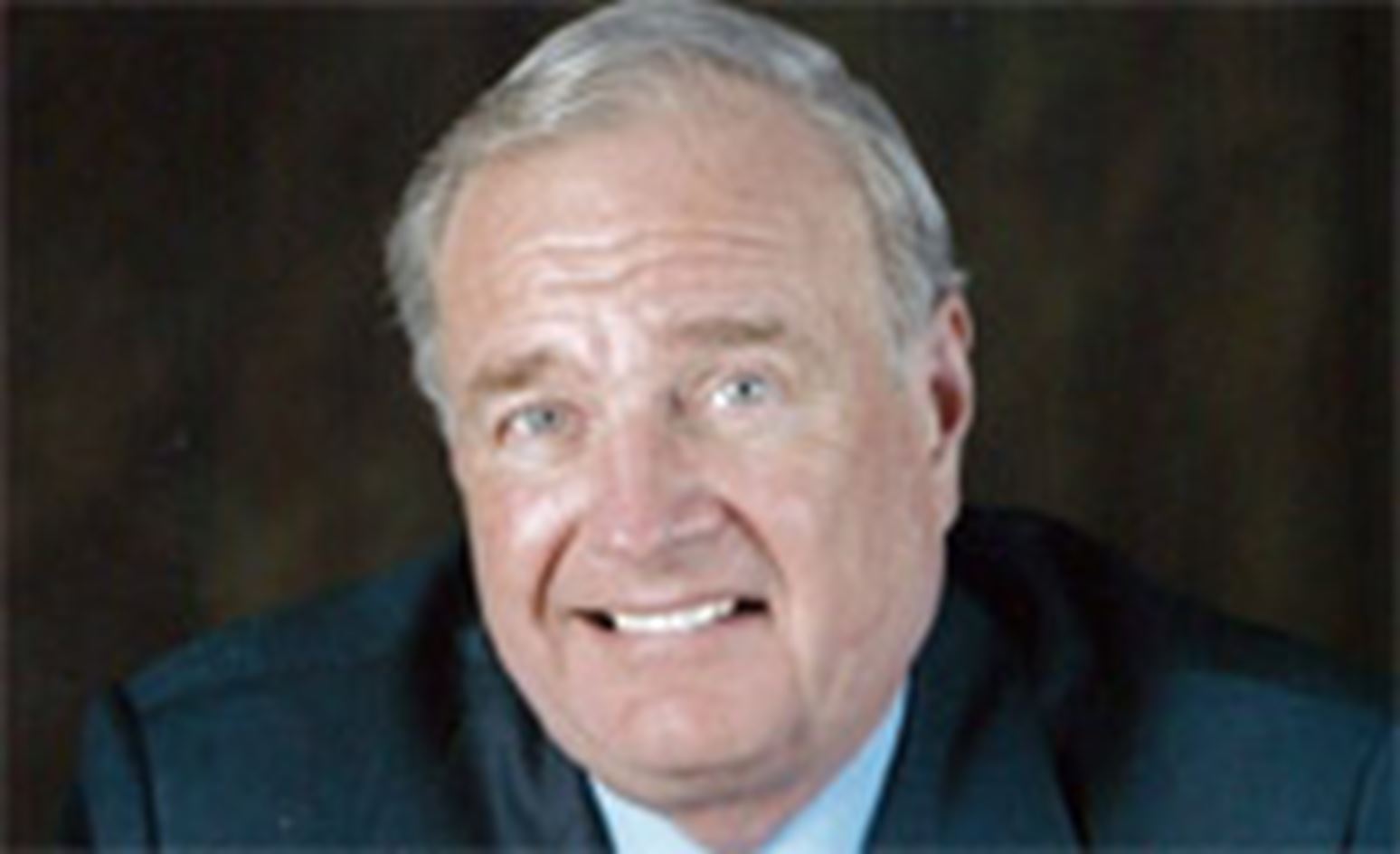When Gerard and I were discussing the upcoming talk with the Right Honourable Paul Martin, he told me a story that resonated with me. Gerard had already interviewed the former premier of Ontario Mike Harris for his book Good Leaders Learn: Lessons from Lifetimes of Leadership, and sought to balance this through interviewing a respected leader from another area of the Canadian political spectrum. He emailed Mr. Martin's team, and heard back within a day - yes, Paul would love to speak with him, and would he like to come meet Paul at his home in Florida? What an opportunity and candid access for Gerard's research. The visit was very enjoyable, with Mr. Martin reflecting on his multifaceted career and sharing a wealth of insights that would benefit aspiring leaders in any realm- business or politics.
In December of 2013, Gerard unexpectedly heard from Paul's team. He would be at an event in London in April, and was wondering if he could be of help and participate in any Ivey events. Not one to miss such an opportunity, Gerard jumped at the chance. He let Paul guide the structure of the event, and Mr. Martin did not want it to be formal- no lecturing, no power points, but a straightforward talk from the heart. Gerard gathered a crowd of incoming MBA students, faculty, and staff to host a casual conversation with Paul.
The breadth of Paul's experience made him a multi-faceted speaker- he told tales from his beginnings as a young lawyer, his entry into and adventures in the world of Canadian and International business, his time as Canadian Prime Minister, and more recently, his work with the Africa Development Bank. Sitting casually with Gerard at the front of the room, his tone and manner were open and approachable. The conversation roamed far and wide, and there were three key leadership lessons that stuck with me.

Professor Gerard Seijts and The Right Honourable Paul Martin
Leadership is Listening
Paul recounted his experience as he was graduating as a lawyer and realizing that he did not want to work in law. He joined PowerCorp, and learned he had both interest and aptitude for the business world. Paul sought out opportunities to learn and develop his skills, working alongside experienced leaders who became mentors, including Paul Desmarais and Maurice Strong. Quickly expanding his work beyond his role as executive assistant, he found himself on leadership teams trying to turn around struggling small businesses.
When Gerard asked Paul to share the biggest lesson he learned from the business world, he responded immediately- "The thing I learned more than anything else- leadership is listening." Paul said that when done well and openly, listening can become a vehicle for change.
With a smile, he relayed his advice for someone about to become a CEO for the first time. Paul said he would tell them "you have got the last word- so you don't have to have the first word, or the middle word. In fact you should shut up until everyone has spoken."
His logic is flawless- if you wait until you've heard everyone speak before you do, you eliminate the chance of contradicting yourself. There are so many other reasons to listen, but the practical nature of this point stuck with me. Keep your word until the end and you won't have to go back on it. Simple brilliance.
Ask Good Questions
Part of leading is learning to fail.
When Paul first started working in the world of business, he recognized that he had no aptitude for engineering. When problems arose related to a physical issue, he left those decisions to those that were more technologically savvy. But when left to solve the problem without guidance, the solution failed.
Paul told us that his hands-off approach failed in two ways.
Firstly, it shows disinterest. Paul said the engineers would think "if he isn't interested in this, why am I?"
Secondly, the subtle message that this sends is that you've no capacity to learn. While Paul may never become an engineer, he told us that expertise is not needed to participate in a conversation on an issue or problem. This lovely quote really spoke to me-
"An intelligent person with common sense can ask good questions about things."
The wisdom and confidence of this statement resonated with me. It takes a lot to be able to admit you are not an expert, especially when you are a leader. Curiosity shows involvement and allows your expert to take the lead; disinterest from a leader allows disinterest from your team.
Paul made it clear that showing interest is not the same as taking control. He explained the point was not to show them where the crank shaft should be, but to demonstrate that you know it is important.
Look Where The Puck Is Going
A proud Canadian, Paul managed to pop a Gretzky-ism in to his talk.
Building on his earlier concept that good leaders ask good questions, Paul encouraged forward-facing leadership. Leadership needs the capacity to look ahead and consider the future.
He spoke to us first about the role of what he dubbed institutional memory. Using a political example, Paul explained that "a minister who thinks they know it all and have forget about institutional memory is fooling themselves."
Again highlighting the need to ask good questions and have clear communication with your team, he spoke of the importance of selling your message to your internal customers. A leader who decides that they have the only correct solution in a vacuum, without accessing the knowledge of their team, is doomed to fail. He urged us to look at reality and ask if we are right.
A common trap for leaders is micromanaging. It is easy to become focused on the small details which distracts from a leader's need to focus on the big picture. Paul cautioned that most managers micromanage the areas they know intimately. Striking the fine balance between active interest and overbearing control can be challenging, but necessary if you are to succeed.
A Message to New Graduates
Paul left us with a personal note. A student asked him how he dealt with stress and stays calm. Paul replied with a grin that he never felt stress in his day to day work life- only when he'd messed up. In general, he finds his golf game the bigger stressor. He said the key is to make sure you enjoy your job.
Excellent advice, Paul. Thank you for your time.
 About the Author
About the Author
Equal parts thinker, tinkerer, science geek, and marketer/sales pro, Rebecca can be found travelling the world as a rep for Ivey Publishing. In her spare time she's also a vinyl junkie, drinker of fine drinks, and voracious reader.
Google+ | Twitter | LinkedIn | Blog
